Bert Smith: The ice hockey player who went from Fife Flyers' mascot to Olympian
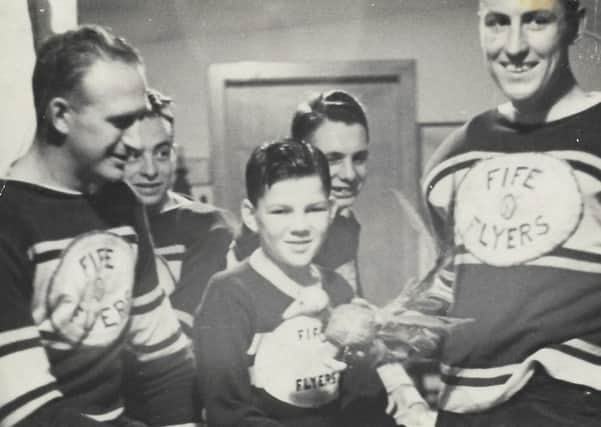

The story of his rise from team mascot on the opening night in 1938 to the status of Olympian is unparalleled – but even that trajectory doesn’t tell the full story of one of the most talented, gifted players to emerge from Kirkcaldy.
Nor does it reveal the full depth of his legacy which saw him go out of his way to help many an up and coming young player – youngsters who themselves went on to become Flyers’ legends – and the early morning coaching sessions which enabled them to take their first steps on to the ice.
Advertisement
Hide AdAdvertisement
Hide AdTo team-mates and opponents he was not only an outstanding player, he was also a gentleman; one they held in the highest respect.
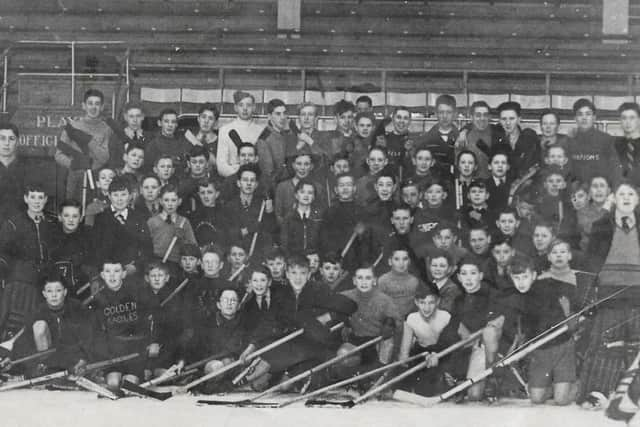

And while there was much more to Bert’s life than ice hockey, it was the sport which opened many doors and took him on some great adventures. around the globe.
It began in 1938 when he was picked as the mascot to lead Fife Flyers out for their first ever ice hockey game in Kirkcaldy as the doors to the rink opened on October 1, 1938.
The Fife Free Press reports of the time refer to him as ‘Wee Smith’ – he was a 13-year-old laddie from Dysart who had grown up playing football, swapping his boots for skates allowed him to create his own sporting legacy on ice.
Advertisement
Hide AdAdvertisement
Hide AdTogether with his lifelong friend, Jimmy Mitchell, Bert started training under the guidance of Les Lovell, the player-coach of that inaugural team.
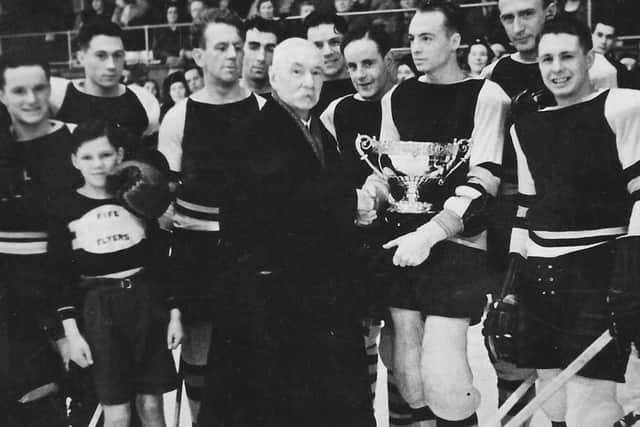

They went on to become the first Kirkcaldy boys to skate with Flyers, and Bert’s talents with a stick and puck quickly grew, although the game was put on hold with the outbreak of World War Two.
Bert joined the RAF and, aged just 19, was a flight engineer on Lancaster bombing raids across Germany.
He joked later he was too young to be scared, ice hockey was much more frightening – but neither did he speak much of those dramatic moments engaged in combat.
Advertisement
Hide AdAdvertisement
Hide AdBack in civvies, he realised his days working as a lithographer in Kirkcaldy wouldn’t give him the time off to pursue his love of ice hockey, so he joined the family’s chain of butcher shops.
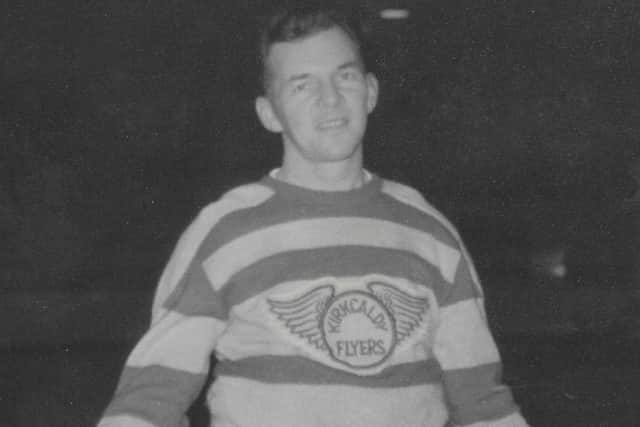

They had four outlets at one stage, including Victoria Road, the Links and one opposite the rink, which was later sold and turned into the hockey supplies store, Can-Am.
Many aspiring young players found excuses to nip across from the rink and talk hockey with him, and, sometimes, emerge with a puck or stick.
On the ice, Bert, a centre ice or left wing, was one of the stand-out skaters of his time “A pathfinder for the sport of ice hockey” was one description.
Advertisement
Hide AdAdvertisement
Hide AdHis breakthrough with Fife Flyers set him on an adventure which took in Olympic Games, world championships, and playing in Europe and around the UK – north and south of the border – in a 20-year career.
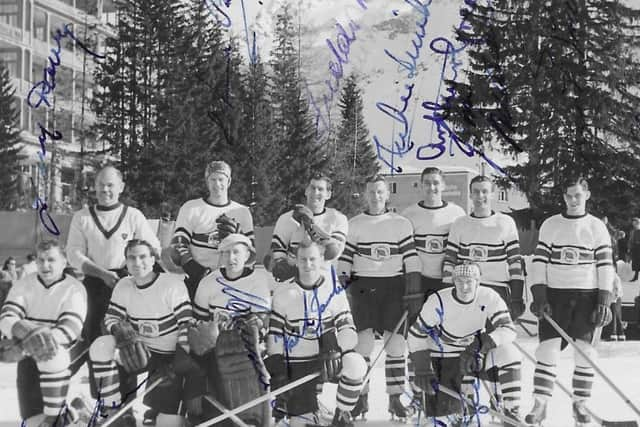

With his skates packed with paper to make them as tight as possible, he set about mesmerising teams with his speed and ability to read the game better than most.
He once famously tormented Bill Sheddon, Falkirk Lions’ tough enforcer, teasing him all night long.
The big man finally snapped and chased Bert round the rink without success. Over a pint afterwards he told the Fifer: “You were too quick for me tonight, but I’ll get you.”
He never did.
Advertisement
Hide AdAdvertisement
Hide AdBert’s resolve was strong too as he dealt with many injuries – a broken leg, fractured skull, cracked thigh and wrist, not to mention the obligatory bruises from all the hacks and whacks which were part of the post-war game.
In 1948/49 he scored 27 goals and notched 34 assists for Flyers, and in ‘50/51 it was 27+34. In total there were over 100 goals for Fife, but the record books for that time are fragmented.
But those returns, and his natural ability saw him catch the attention of the international selectors and, in 1948, he was part of the GB squad which went to Switzerland for the Winter Olympics.
The journey to St Moritz opened his eyes to the opportunities the sport gave him to travel.
Advertisement
Hide AdAdvertisement
Hide AdHe enjoyed two seasons with Amsterdam Ice Birds in Holland, along with Falkirk Lions’ Ray Dinardo, travelling some 100,000 miles to play in the Western European League which took in Switzerland, Italy, Sweden, France and Belgium.
In 1948 he was invited to join the GB squad to take part in the Winter Olympics in Switzerland, and in 1951 Paris beckoned for the world championships.
The letter from the British Ice Hockey Association inviting him to join the squad underlined the formality of the times, stressing “you will not only give of your best on the ice, but also behave off the ice in such a manner as to merit 100 per cent commendation.”
Naturally, he did.
Bert had to regain his amateur status to play for Fife on his return to the Kingdom in 1950, and he went on to ice with Murrayfield Royals, and also Altrincham Aces – one of a number of Fifers who made the regular trips to Manchester with their skates in the boot of the car.
Advertisement
Hide AdAdvertisement
Hide AdThose European travels also gave him a love of ski-ing – another sport he excelled in with annual visits to Champery, Switzerland, as well as France.
Champery was also the scene of a fairytale finale to his distinguished career.
He’d played and coached there during his holidays and, in 1959. returned to find the team pushing for promotion after seven years in the lower league.
Under Bert’s guidance they hit a winning run but, after three games, he broke a bone in his ankle while “jousting with three opponents”.
Advertisement
Hide AdAdvertisement
Hide AdWith everything hinged on the outcome of the final game. Bert got a last-minute approval to lace up his skates.
He saw his side lead 3-1, but they were pulled back to 3-3 in the final minute when Bert careered through in a do or die move, and gave them a precious lead. A fifth goal followed and Champry were promoted.
The match reports of the time speak of fans dancing, singing and letting off fireworks around the rink and, for the first time in seven seasons, they sang their victory song.
Bert returned to Fife and, went back to working in his butcher’s shop, nipping across the road to skate every Tuesday. He met his wife, Mary, when she brought a bus load of pupils from Balwearie High School to the rink for a skating session.
Advertisement
Hide AdAdvertisement
Hide AdAfter playing with Murrayfield and Altrincham, he returned to Flyers where he won the Mirror of Merit for the second time in 1966 – his first came in 1953-54.
After hanging his own skates up, Bert stepped back from the sport – ice hockey was a passion, but he had many other interests.
While there were regular get-togethers with his closest friends from the sport and many nights spent reminiscing with Jimmy Mitchell, Marshall Key, one of the first pro hockey players to emerge in Dundee, and Sam McDonald who was part of Flyers’ legendary Perth Line of the 1960, he wasn’t a rinkside regular.
He sold his businesses and retired to Leuchars where he joined St Michaels Golf Club, serving as secretary.
Bert passed away aged 75 in 2001.
His obituary noted he was “a man with not a bad word to say about anyone”.
>> With grateful thanks to Mary and Allan Smith for their help researching this article.